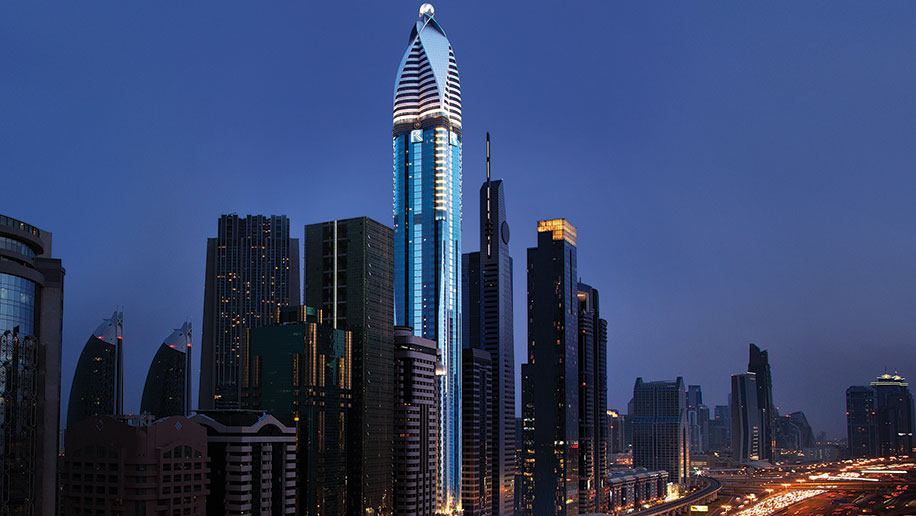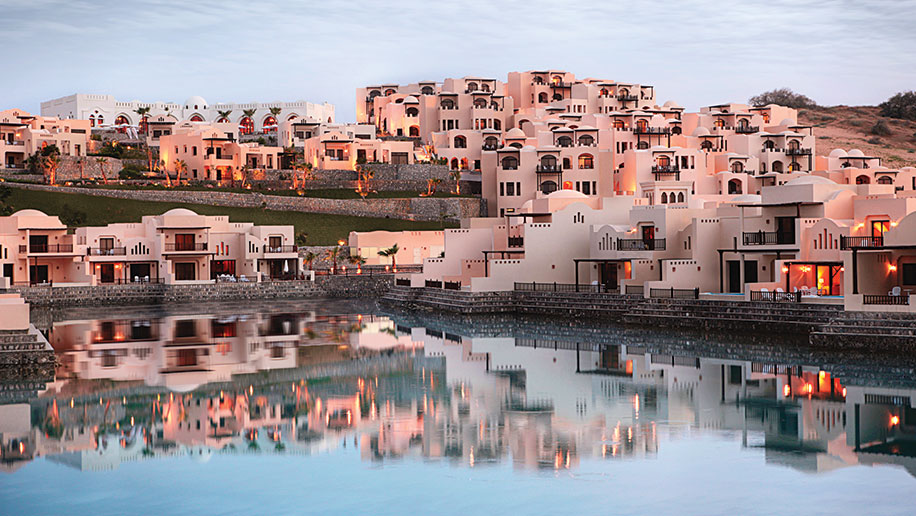
An industry veteran with over three decades spent understanding the hotel business inside out, Guy Hutchinson was appointed as president and CEO of Abu Dhabi-based Rotana in January 2020. Many who knew Hutchinson argue that it is his sheer depth and experience that resulted in him becoming a bulwark for the Abu Dhabi-based hotel management company during the most damaging period of the pandemic in 2020 and 2021. Two-and-a-half years in his role, Rotana, which was founded back in 1992 by Nasser Al Nowais and Selim El Zyr, seems to have come out on the other side of the pandemic in rude health. “As of today, we are 70 trading hotels, with a pipeline of another 42 – and the pipeline is growing fast,” Hutchinson told Business Traveller Middle East recently about the company whose projects span 24 cities across 14 countries in the Middle East, Africa and Europe from Qatar, Saudi Arabia and Oman to Bosnia & Herzegovina, Congo and Lebanon.
Rotana properties reportedly serve over six million guests per year, including 10,012 keys across 36 hotels in the UAE alone. Ask Hutchinson if the current demand within the UAE can absorb Rotana’s growth, and he offers no ambiguity. “This region cannot be measured in context with some other markets. Markets like Dubai have their own rhythm, developments, structure and context which is completely different. So we have a lot of confidence in the pipeline we have. In fact, we think it’s going to accelerate.” His reading of the market aligns with official numbers about the UAE’s hotel sector performance. According to tourism figures for Q1 2022, UAE hotel establishments attracted nearly six million visitors who spent 25 million hotel nights, a growth of 10 per cent over the pre-pandemic period of Q1 2019. The average duration of hotel guest stays in the UAE increased during the same period, from three nights to four.
Moreover, the occupancy rate of hotel establishments in the country during this period achieved a growth of 80 per cent, believed to be among the highest globally. Hotels generated a total revenue of Dhs11 billion, a 20 per cent increase compared to the same period in 2019 and resumed operations at full capacity of approximately 200,000 hotel rooms.
While its home market has a solid foundation, Rotana has become a major player regionally too. Of the 42 hotels in the pipeline, four are scheduled to open this year itself. Also, of those 42 projects, 10 will deliver more than 3,000 keys in the next three years indicating the scale of those properties. Qatar and Saudi Arabia are among those where aggressive expansion plans are being charted. “We’ve seen Qatar grow in the run-up to the World Cup. We’re now up to four trading assets and will open another two in Qatar. We will have six properties in total in Qatar, maybe seven, by the end of this year,” notes Hutchinson about the country where it recently signed the management of Residences by Rotana, a 503-key property.
Another market that Rotana is bullish about is Saudi. “Saudi Arabia is a critical market. It’s a market we’re very excited about not just because of the mega projects, but because we’re opening destinations like Al Baha – where we’ve signed hotels – for the first time, both to international tourism and even to domestic tourism.
“It’s about bringing global tourism standards to the kingdom. So it’s important to really hit those international brand marks. One of the things we are doing is that we are putting a twist which is specific to Saudi Arabia on Centro, our mid-market brand. It’s going to have a theme through its design, art, and culture which will very much reflect local Saudi culture. We’re bringing sustainable produce from local markets into Centro to make it a much more Saudi-centric product.”
While Centro is the mid-market brand for Rotana, its other offerings include Rotana Hotels and Resorts which is the upmarket brand and includes four- and five-star properties; Rayhaan Hotels and Resorts which was the first alcohol-free hospitality brand in the region; Arjaan Hotel Apartments; and The Residences which operate hotel-residence hybrid units and includes studio-four bedroom apartments and villas.
At this year’s Arabian Travel Market (ATM), Rotana introduced a sixth brand – Edge. “This brand is a collection of independent hotels or hotels where owners need an uplift in performance. Sometimes, there are hospitality assets which don’t fit cleanly into one brand or another because it might be a heritage building, and Edge is a brand which can capture those assets that retain their individual characteristics. The brand serves to drive their performance from a quality, management and financial perspective,” explains Hutchinson. Rotana says that its Edge brand has no specific requirements for the size or nature of the properties it will incorporate, and allows properties that sign up to retain their unique branding. At the ATM, Rotana confirmed that two properties were already signed under the new brand, including 328 keys in Dubai and 268 keys in Istanbul.
While Rotana’s decision to start a sixth brand will allow it to cast a wider net over the properties that it can take under its wing, Hutchinson says that there has also been a surprising diversification of its source markets over the course of the pandemic. “One of the strengths of this region is how diversified the feeder markets are. You might have a disruption in terms of Russia and Ukraine, but that is neutralised by other markets that are growing. The most surprising market for us in the last 15-18 months has been Latin America. If you look at the logistics of getting from Brazil or Mexico to the UAE, it’s not so straightforward. But these have grown to be very substantial markets for some of our hotels. For one of our hotels, Mexico was the single biggest initial source market. Unexpected, but this is the power of a destination like this, and an airline on the scale of Emirates, Etihad or Qatar Airways.”
Given his multi-decade experience in the industry, Hutchinson is in a position to determine which travel trends are fads and which are more permanent changes that necessitate a response. “I’m not sure whether some of the travel patterns that have emerged [from the pandemic] will be there forever. There were travel patterns that emerged out of necessity. But if we’re surprised by anything, it’s probably the pace at which travel patterns are normalising. So things like MICE – we did not expect to see companies from Europe or the US holding meetings for 200-300 people in Dubai or Abu Dhabi. I didn’t expect that to return probably until next year. We thought the whole concept of the hybrid meetings or partial online meetings would be something for the next 18 months or two years. [Now], I think in six months that concept may have gone completely because of the pace at which we’re seeing people bringing back face-to-face large-scale meetings. The most surprising trend for us is the speed with which people are reclaiming those normal travel patterns,” says Hutchinson.
Strategically, Rotana is also pushing ahead in markets that aren’t fully on the radar of Western-based hotel operators and management companies. An example is Iraq where Rotana recently announced the soft opening of the Slemani Rotana five-star property in the city of Sulaymaniyah – the fourth Rotana outpost in Iraq after Erbil Rotana, Erbil Arjaan by Rotana and Babylon Rotana, Baghdad.
Much of the direction that Rotana is currently headed towards, Hutchinson attributes to its co-founders Nasser Al Nowais – who was awarded the Lifetime Achievement Award at this year’s Business Traveller Middle East awards – and Selim El Zyr. “Both Nasser and Selim have a very active role in the company. They’re hugely influential. They are involved in the day-to-day operations of the company. There’s so much experience and knowledge vested in these two individuals. There are so many relationships [that they’ve] built across the region, that the value they bring to us is substantial,” says Hutchinson.
He adds that while the hotel industry in this region is only around 25-30 years old – compared to 300 years in markets like New York or London – it is in cities such as Dubai and Abu Dhabi where the evolution of the sector is the most active. “We’re driven by running hotels for hoteliers. If you’re a hospitality professional, this is how [and where] you want to operate,” says Hutchinson who is only too happy to, three decades in, still find himself in the thick of it.














